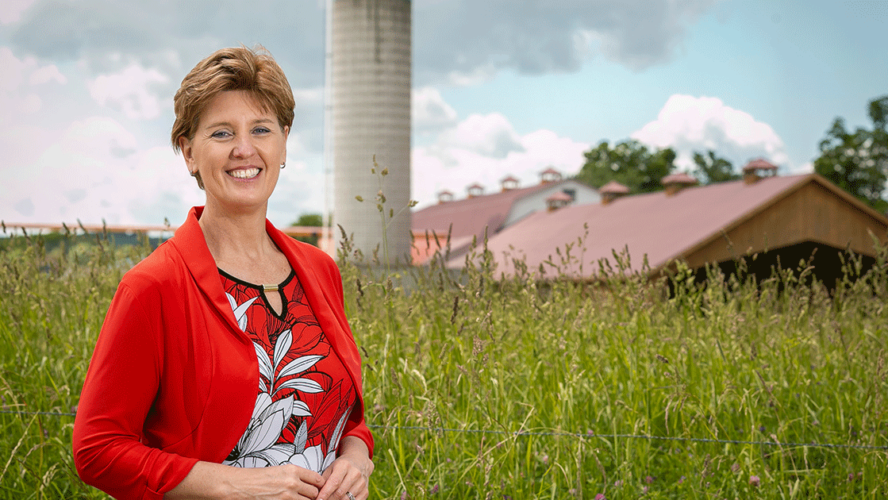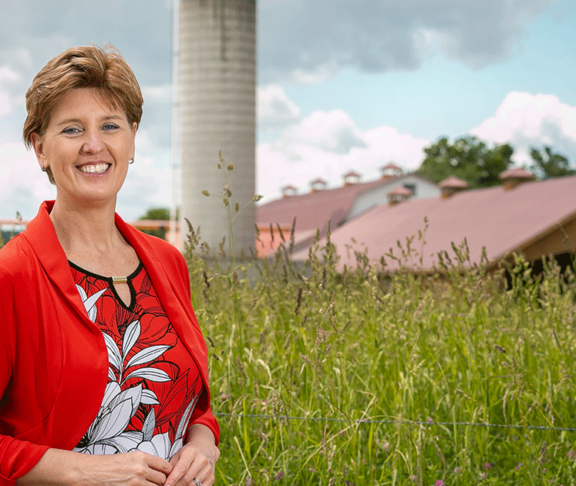
Honourable Marie-Claude Bibeau
Minister of Agriculture and Agri-Food

Within the context of sustainable development, what are some of the biggest challenges faced by Canada’s agriculture sector?
Canadian farmers are on the front lines of climate change and when extreme weather strikes – such as droughts and flooding — it hits their bottom lines directly. There are more extreme weather events associated with climate change and that is having a significant impact on agricultural production.
However, the impacts are playing out differently all across Canada. For example, in 2022 the high winds from Hurricane Fiona caused severe damage to farms, infrastructure, livestock and crops right across Atlantic Canada. While in 2021, the devastating floods in British Columbia wiped out more than 1,000 farms and 2.5 million livestock.
In an effort to address some of the challenges resulting from climate change and to minimize its impact on the sector, farmers have already demonstrated leadership by adopting climate-smart farming practices and beneficial management practices such as techniques like no-till, low-till, cover cropping, rotational grazing and agroforestry.
Adopting these types of climate-smart practices is essential to improving the sector’s resilience, so that farmers can quickly get back to doing what they do best: producing high-quality food for Canadians. We also need to ensure that our efforts to reduce emissions do not undermine the competitiveness of farmers, especially at a time when food insecurity has reached unprecedented levels worldwide, the supply chain is increasingly strained and labour challenges negatively affect agricultural and processing operations.
Given the large variations across regions and farm types across Canada, tailor-made approaches are required for them to be as effective as possible, and Agriculture and Agri-food Canada is committed to continuing to work in partnership with the sector to support the important work already underway.

How is the Ministry of Agriculture and Agri-Food Canada contributing towards achieving Net-Zero by 2050?
With only eight growing seasons remaining until 2030, and the work required to get to net-zero emissions in 2050, the Government of Canada is committed to taking more action to support farmers and producers to reduce emissions, implement climate-smart farming practices, and grow the economy.
This is why Agriculture and Agri-Food Canada is developing a Sustainable Agriculture Strategy, in collaboration with a wide range of partners, to provide an integrated and coordinated approach to improving the agriculture sector’s environmental performance and supporting its long-term vitality. The online consultations are open until March 31st. The Strategy will focus on five priority areas: soil health, climate adaptation and resilience, water, climate change mitigation, and biodiversity. It will also inform actions that the Government of Canada can take to contribute to its target of reducing emissions from fertilizer application by 30 per cent by 2030 (based on 2020 levels).
In addition, on April 1st, federal-provincial-territorial ministers will launch the new Sustainable Canadian Agricultural Partnership (Sustainable CAP), which supports our shared vision for Canada as a world leader in agriculture and agri-food production. Over the next five years, Sustainable CAP will provide $3.5 billion in federal-provincial-territorial investments, which includes a 25 per cent increase in funding for cost-shared activities compared to the previous framework.
The Government of Canada is also investing over $1.5 billion for initiatives that will help farmers and processors reduce their environmental footprint, invest in clean technologies, and collaborate with researchers in ‘living labs’ to adopt sustainable practices that work on the farm. These initiatives include:
- $670 million for the On-Farm Climate Action Fund to support the adoption of practices that contribute to the fertilizer emissions target and Global Methane Pledge. This includes funding provided directly to farmers to accelerate the adoption of beneficial management practices to reduce greenhouse gases, store carbon and improve climate resiliency and support sustainable farming for decades to come.
- $495.7 million in the Agricultural Clean Technology Program to scale up the development and adoption of clean technology in the sector.
- $100 million in Transformative Science for a sustainable sector in an uncertain climate and net-zero economy for 2050 for fundamental and applied research to support a path to net zero emissions, knowledge transfer, and developing metrics.
- $150 million for a Resilient Agricultural Landscapes Program to support carbon sequestration, adaptation and address other environmental co-benefits. This program is to be developed by AAFC in discussion with the provinces and territories.
- $185 million for Agricultural Climate Solutions – Living Labs initiative.
Now is the time to build on past and current successes and to work together to address ongoing climate and environment challenges in the sector while ensuring productivity continues to meet growing demands for food.

Why is clean technology essential towards transitioning Canada into a more sustainable form of agriculture?
Increasing the use of clean technology is essential to both growing the economy and protecting the environment. This will enable farmers to increase their competitiveness and reduce their carbon footprints while allowing innovators to develop new technologies with a positive environmental impact. It is as good for the bottom line, as it is for the climate.
Canada’s hard-working farmers and ranchers have a solid track record of using innovation and new technologies to preserve and protect the natural resources on which they depend. For example, zero-emission on-farm equipment or machinery, precision agriculture, artificial intelligence, and innovations that enable the use of alternative and bioenergy. The recently expanded $495.7-million Agricultural Clean Technology Program supports the purchase and installation of commercially available clean technologies and processes. Additional investments to help farmers adapt to changing climate conditions and boost their long-term competitiveness, while cutting emissions, include the $185 million Agricultural Climate Solutions – Living Labs initiative, and the $200 million On-Farm Climate Action Fund.

Why is it important for the Ministry of Agriculture and Agri-Food Canada to work with sector leaders towards improving outcomes for a sustainable future?
Collaboration is vital to ensuring that Canada can both fight climate change and grow the economy. Canadian farmers have long been responsible stewards of the land. Let’s work together to ensure prosperity, and build upon work already underway in the agriculture sector and beyond.
For example, AAFC is sitting down with farmers across the country to shape Canada’s first-ever Sustainable Agriculture Strategy, a roadmap to help farmers adapt to current climate impacts and build resilience to a changing climate. Feedback received through the consultation process will directly shape the Strategy and support the work of the advisory committee, co-chaired by AAFC and the Canadian Federation of Agriculture. This committee will meet regularly and is comprised of industry experts, including producer associations, Environment and Climate Change Canada and representatives from non-governmental organizations.
The Sustainable Agriculture Strategy will help set a shared direction for collective action to improve environmental performance in the sector over the long-term, supporting farmer livelihoods and the long-term business vitality of the sector.

What message would you like to tell Canadians, and Canadian food producers this Earth-Month?
The Government is committed to helping producers further adopt practices and technologies that reduce emissions and protect the environment without compromising production. I invite everyone to read the Guelph Statement, our shared federal, provincial and territorial vision for the future of sustainable agriculture in Canada. Farmers work hard to safeguard the environment, knowing it preserves their farms for future generations. Their efforts present a win for their farms, consumers, and the Canadian economy by responding to domestic and global demands for sustainable food.


